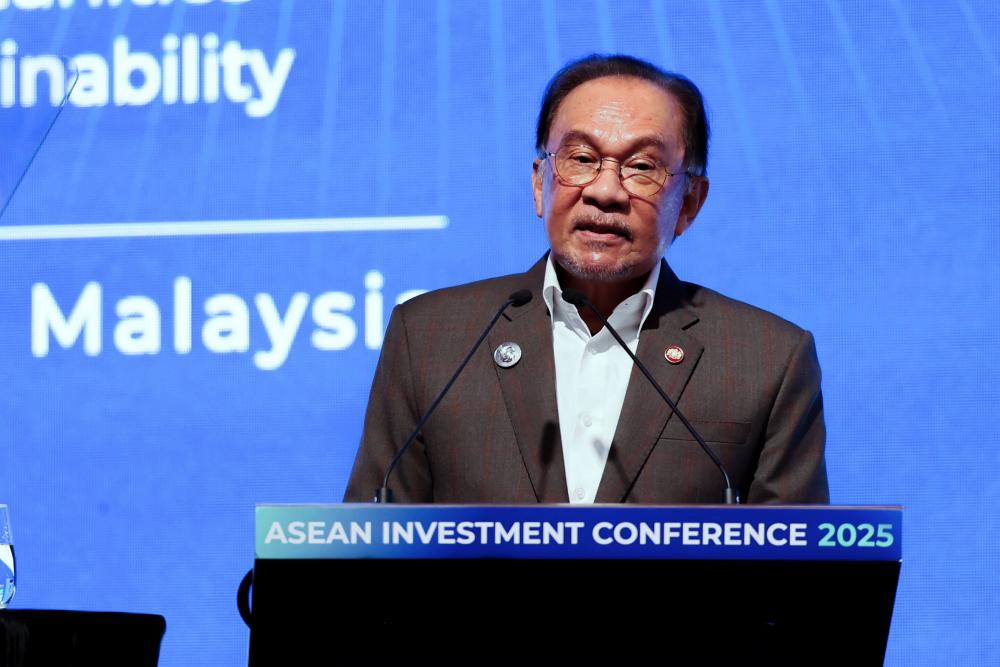PETALING JAYA: Malaysia will not engage in megaphone diplomacy over the US tariff whiplash, said Prime Minister Datuk Seri Anwar Ibrahim yesterday.
Instead, Malaysia would pursue its trademark quiet diplomacy by deploying officials to Washington to initiate a dialogue.
“There may be limited room to revisit the underlying intent, but there is still scope to fine-tune the policy’s implementation,” Anwar said at the Asean Investment Conference.
Finance Minister II Datuk Seri Amir Hamzah Azizan later confirmed that the Malaysian delegation is expected to depart for Washington by the end of April.
Anwar added that, as always, Malaysia would adapt.
“Winds may shift, but we do not drift. Our trade diversification strategy is already gathering momentum.
“While we intend to remain a steadfast trading partner with the US, we will, in parallel, take all necessary steps to protect our economic interests.
“This includes engaging proactively with the US to achieve a mutually beneficial outcome, while broadening and deepening our ties with major trade partners across the EU, Asia, the Middle East and Africa.”
Anwar noted that Malaysia’s trade with the US has long been mutually advantageous.
“Our exports support not only growth at home, but also high-quality jobs across the US.”
Reports indicate the US has slapped a steep 24% retaliatory tariff on Malaysian imports.
US President Donald Trump recently unveiled sweeping tariffs on all trading partners, a move widely seen as unprecedented in modern trade policy.
Among the worst hit are China, with a 34% tariff, the EU at 20%, Vietnam 46%, Sri Lanka and Myanmar both at 44%, Cambodia at 49%, and Laos at 48%.
Anwar also reaffirmed his belief in Asean’s enduring resilience.
He said for about six decades the bloc has weathered wars, crises and coups.
“In times such as these, there’s a temptation to retreat into nostalgia or fatalism, to believe the global order is beyond repair or that regional cooperation is too slow to matter.
“Yet Asean has continued to inch forward, often frustratingly so, but forward nonetheless.”
As tariff battles rage, Anwar warned of a fracturing global order, adding that Asean must increasingly rely on itself.
“This means strengthening intra-Asean trade. We must move beyond rhetoric to real execution.
“While tariff liberalisation within the region is largely complete, regulatory alignment, cross-border logistics and digital connectivity remain unfinished business.”
He noted the importance of external partnerships.
“Our dialogue and sectoral partners span six continents – few regional blocs can match that reach.
“As chair this year, Malaysia will focus on revitalising strategic platforms such Asean Plus Three to bolster economic resilience.”
He said this week’s Asean Finance Track will spotlight regional cooperation citing the expansion of digital payment connectivity.
“Malaysia, Indonesia, Singapore and Thailand are already linked. Later today, we’ll launch the extension to Cambodia, with the goal of covering all Asean nations.
“This will boost trade and tourism within the region.”
He urged deeper integration to help businesses tap Asean’s full potential and proposed nurturing regional champions in sectors such as finance, energy, healthcare, tourism, telecommunications and logistics.
“The Trump tariffs aren’t the first threat to multilateralism and they won’t be the last.
“But if Asean stays open, pragmatic and cohesive, we may remain among the few who still believe the world works better when it works together.”
Anwar outlined Malaysia’s vision for Asean, namely a prosperous, sustainable and inclusive region backed by political will, capital, resilience and sub-regional progress.
He cited the Johor–Singapore Special Economic Zone as a meaningful step, not a silver bullet, showing how cross-border cooperation can deliver tangible gains.
Malaysia is also investing in its border regions with Thailand, Sabah, Sarawak and Kalimantan to spur shared prosperity.
“Resilience also means infrastructure that can weather both literal and financial storms.”
He added that on green growth it is now a strategic economic imperative.
“Carbon capture, circular production and low-emission innovation aren’t fringe, they’re the future.”
Turning to the digital economy, Anwar warned of growing inequality.
“Asean’s digital transformation is real but uneven. Without corrective investment, AI may widen the divide.”
He also highlighted the challenge for small businesses meeting global sustainability standards, prompting Malaysia to launch the Asean Simplified ESG Disclosure Guide for SMEs.”
“In the end, it’s these grounded, tangible efforts that will determine whether Asean’s vision becomes reality or fades into a historical footnote.”
As tariff battles rage, Anwar warned of a fracturing global order, adding that Asean must increasingly rely on itself. – BERNAMAPIX









